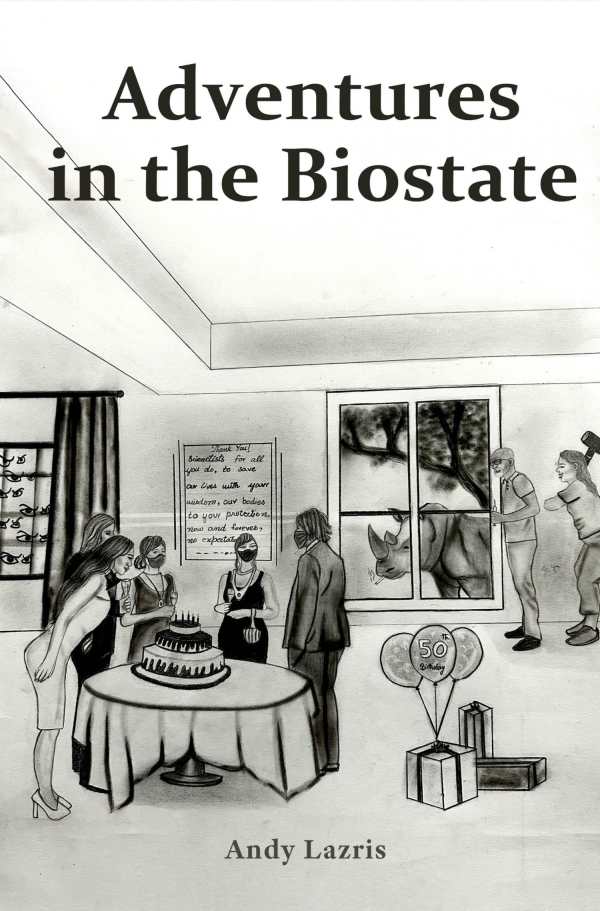
Adventures in the Biostate
In the near-future dystopian landscape of the satirical novel Adventures in the Biostate, public health concerns are exploited to control people’s lives.
Andy Lazris’s mordant satirical novel Adventures in the Biostate imagines that the world is run by health zealots.
In a near-future dystopian landscape, public health concerns are exploited to control people’s lives. Doctors and government forces impose an authoritarian regime after virulent strains of COVID-19 and monkeypox combine, killing many and ravaging entire communities. When the president goes missing, a Johns Hopkins professor and “liberal Poindexter,” Joseph, becomes skeptical of the medical authorities and is deemed an enemy of the state.
Indeed, for Joseph and others, there’s much to contend with: media and pharmaceutical industries are complicit in the broader efforts to scare and control the public, manufacturing a perpetual state of crisis in which public health threats are exaggerated with ulterior motives. Also supporting these forces are a group of four, obsessed with “beer, bowling, butts, and badass!”, who wage a murderous campaign on behalf of the the new world order.
At times more screed than story, the book starts with a heavy dose of exposition. Further, strong condemnations of doctors, public credulity, and the Centers for Disease Control and Prevention consume considerable space. And discursions to cover past bureaucratic sins like the Tuskegee syphilis study dilute the book further. Indeed, the prose is dominated by vitriol and hyperbole: a character’s collegiate softball career is said to have been “yanked from under her by COVID’s draconian decrees,” and masks are called “as duplicitous and hateful as the swastika, as the Klan hood, as the Medieval cross.” Contrarian sensibilities impede the book’s forward movement throughout.
The book’s dialogues are also leveraged in service of ideologies, with characters monologuing at length, comparing masks and immunizations to slavery and Nazism. Such broad rhetorical assertions become wearying. And even though its humor is self-consciously over the top, it becomes repetitive in its circulation around health themes too: an unhealthy marriage is compared to “a dog dying of monkeypox,” for example. Other evocations are too on the nose, as with character nicknames like Mic Medicine and Jolly Jenn. Indeed, subtlety is in short supply: the biostate’s architects are unveiled as hypocrites without a sense of surprise, some confess to wanting power while belittling others, and a committee of experts is granted unlimited power over government policies. These tendencies undermine central characterizations as well, as when President Julie Scanlon is depicted as having been plucked from obscurity after “serving burgers at a Wendy’s, and that was only because she had been fired from McDonald’s.” Even the book’s neat resolution evades satisfaction by setting up more pontificating about freedom and restrictions.
In the dystopian novel Adventures in the Biostate, public health measures are used to oppress the populace.
Reviewed by
Joseph S. Pete
Disclosure: This article is not an endorsement, but a review. The publisher of this book provided free copies of the book and paid a small fee to have their book reviewed by a professional reviewer. Foreword Reviews and Clarion Reviews make no guarantee that the publisher will receive a positive review. Foreword Magazine, Inc. is disclosing this in accordance with the Federal Trade Commission’s 16 CFR, Part 255.
